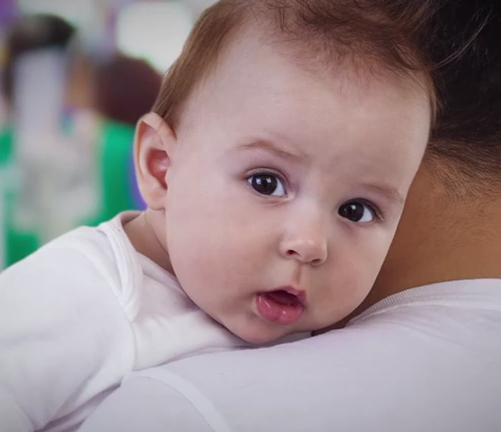So you're in line at the grocery store,
你在雜貨店排隊,
and there's a parent holding a baby right in front of you.
前面有個家長抱著一個嬰兒。
You're minding your own business, but when you look up,
你在做自己的事,但當你抬頭時,
that baby just won't stop staring at you like you're the most interesting thing on the planet.
看到那個嬰兒一直不停地盯著你,好像你是這個星球上最有趣的東西。
You might feel like you've grown a second head,
你可能會覺得自己長了第二顆腦袋,
or like you have chocolate smeared all over your mouth,
或者巧克力涂了滿嘴,
but in reality, that baby just likes looking at your face.
但事實上,那個嬰兒只是喜歡看你的臉。
Because there's a lot to figure out there!
因為臉上有很多要理解的東西!
From very early in life, babies seem to like looking at faces,
嬰兒從非常小的時候就喜歡看人臉,
or even just configurations of shapes that look like faces.
或者看起來像臉的形狀。
They also prefer faces they recognize to ones they don't,
他們也更喜歡看自己認識之人的臉,而不是陌生人的臉,
but they'll sometimes spend a little more time looking at strangers because they're new or different.
但他們有時會花更多的時間看陌生人,因為他們是新的或不同的。
Faces are important to babies
臉對嬰兒很重要,
because they're basically completely helpless and have to rely on their caregivers to survive.
因為嬰兒基本上是完全無助的,不得不依靠他們的看護人來生存。
They need to be able to find and communicate with the people who feed them and change their diapers,
他們需要能夠找到喂養他們并給他們換尿布的人,并與后者交流,
and knowing what they look like is an important part of that.
所以知道看護人的長相很重要。
Even if said communication just involves screaming at the top of their lungs for a while.
即使交流也只是他們驚聲尖叫一會兒。
Babies are also busy taking in huge amounts of information to help them understand the world,
嬰兒們也忙于獲取大量的信息來幫助自己了解這個世界,
and faces can teach them a lot.
而臉可以教會他們很多東西。
From our expressions to how our mouths form words,
從我們的表情到嘴如何說話,
a lot of our communication as humans happens through our faces.
人類的很多交流都是通過面部來進行的。
In those first few months of life,
在生命最初的幾個月里,
babies are not only beginning to learn how to recognize their parents or grandparents,
嬰兒不僅開始學習如何辨別他們的父母或祖父母,
but also about all the emotions conveyed by facial expressions. There's a lot to learn!
還學習面部表情傳達的所有情感。要學的真多!
So when a baby is staring at you in the grocery store,
所以當一個嬰兒在雜貨店盯著你時,
her little brain is probably trying to figure if she knows you and what categories your face fits into,
她的小腦袋可能想確定她是否知道你,你的臉是什么類別,
like if you're happy or sad.
比如你是高興還是悲傷。
Now, babies might be born ready to learn from the world around them,
嬰兒可能生來就準備向周圍世界學習,
but there's still some question about whether looking at faces is an innate characteristic,
但是對于看臉是否是一種與生俱來的特征仍存在一些疑問,
one you're born with, or if it's influenced by experience.
即你一出生就是這樣的人,還是受了經驗的影響。
And like with a lot of the age-old, nature versus nurture debate, it's a little bit of both.
就像很多由來已久的先天和后天辯論一樣,它兩者都占了一點兒。
On the nature side, there's some evidence that, within hours to days of being born,
在先天方面,有些證據表明,嬰兒在出生數小時內,
babies can copy facial expressions they see, like if you stick out your tongue at them.
可以模仿他們看到的面部表情,比如你在他們面前伸舌頭。
Not all studies agree with those results,
但不是所有的研究都同意這些結果,
but it's possible that there's an innate ability for finding and mimicking expressions.
嬰兒有可能天生就有發現和模仿表情的能力。
Other research has found that within hours of birth,
其他研究發現,嬰兒在出生數小時內
babies can discriminate between their mother's face and a stranger's,
可以區分出母親和陌生人的臉,
which might mean their brain is ready to recognize faces without much information.
這可能意味著他們的大腦準備在沒有太多信息的情況下識別人臉。
So, some evidence suggests that babies may be predisposed
因此,一些證據表明,嬰兒可能有先天傾向
to look for information from faces right when they're born.
在出生后從面前的臉上尋找信息。

But other studies have shown that it takes experience to get really good at it.
但其他研究表明,要想真正做好它需要經驗。
Either way, all the time babies and their caregivers spend looking at each other
不管怎樣,嬰兒和他們的看護人都一直看著對方,
causes rapid improvement in babies' abilities to process and recognize faces.
導致嬰兒處理和識別人臉的能力迅速提高。
Starting around 3 months old, they even begin to group different kinds of faces,
嬰兒從3個月大開始就給不同的面孔分組,
like human versus animals and kids versus adults.
比如人類和動物,兒童和成人。
One especially cool study had babies and adults look at a series of different monkey faces,
有一項特別有趣的研究,研究人員讓嬰兒和成人觀看一系列不同的猴臉,
and also at a bunch of different adult human faces.
還有一堆不同的成人面孔。
They found that 6-month-old babies are actually better at differentiating between monkey faces than adults are!
他們發現,6個月大的嬰兒實際上比成年人更擅長分辨猴臉。
But when they're about 9 months old, that ability goes away because of what's called perceptual narrowing,
但是當他們9個月大的時候,這種能力就消失了,原因是所謂的知覺變窄,
where their perception starts to change based on their experience.
即人們的感知根據經驗開始改變。
Basically, the baby learns that paying attention to the differences in human faces
基本上,嬰兒學會了注意人類面孔的差異
is way more important for its life than the differences in monkey faces,
比注意猴臉差異,對他們的生命來說更重要,
so it should focus more on humans than monkeys.
所以他們應該更多地關注人類,而不是猴子。
As the brain develops over time, the pathways used to recognize human faces get more efficient,
隨著時間的推移,嬰兒大腦識別人臉的途徑變得更加有效,
and the ones for monkeys get pruned away.
而識別猴子的途徑會被修剪掉。
But when researchers expose babies to lots of monkey faces between when they're 6 and 9 months old,
但是當研究人員把6個月到9個月大的嬰兒暴露在大量猴子面前時,
they effectively teach their brains that monkeys are important to pay attention to,
他們可以有效地告訴大腦,猴子很重要,要注意,
so they keep that ability for a lot longer.
所以他們保持這種能力的時間更長。
Even though babies are born with some skills,
盡管嬰兒天生就有一些技能,
experience helps tell them what parts of the world they should pay attention to,
但經驗能幫助告訴他們應該關注世界的哪些地方,
and that shapes how their brain's perception and recognition systems develop.
并決定他們大腦的感知和識別系統如何發展。
So, it's a little bit of nature and a little bit of nurture
所以,既有一點兒先天因素,又有后天因素
that goes into that cute, big-eyed baby staring at you.
讓那個可愛的大眼睛寶寶盯著你看。
And yeah, in that moment, your face might just be the most interesting thing on the planet.
是的,在那一刻,你的臉可能是地球上最有趣的東西。
But don't rule out the possibility that you might have a little chocolate on your face, too.
但也不要排除你臉上有巧克力的可能性。
Thanks for watching this episode of SciShow Psych,
感謝您收看本期的心理科學秀,
brought to you by our patrons on Patreon.
它是由Patreon贊助的。
If you'd like to help us keep exploring all the weird and wonderful things that happen in our brains,
如果你愿意幫助我們繼續探索大腦中發生的所有奇怪或奇妙的事情,
you can go to patreon.com/scishow.
可以登錄patreon.com/scishow。











